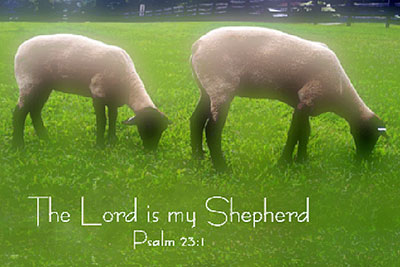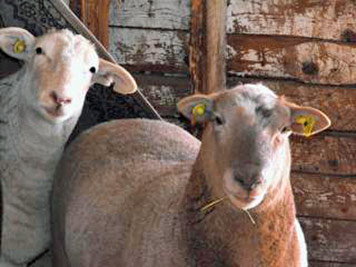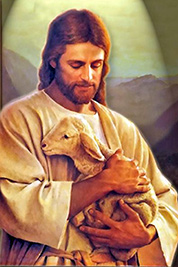MY SHEPHERD – PSALM 23 – Part 2
Mi Pastor – Salmos 23 – Parte 2
By Mary Hunt Webb
Posted Friday, March 2, 2012

Today we look at what it means to be a sheep in the Lord's care. [Photo courtesy of The Glory Site (theglorysite.com).]
Psalm 23 — "1) The LORD is my shepherd; I shall not want. 2) He maketh me to lie down in green pastures: he leadeth me beside the still waters. 3) He restoreth my soul: he leadeth me in the paths of righteousness for his name's sake. 4) Yea, though I walk through the valley of the shadow of death, I will fear no evil: for thou art with me; thy rod and thy staff they comfort me. 5) Thou preparest a table before me in the presence of mine enemies: thou anointest my head with oil; my cup runneth over. 6) Surely goodness and mercy shall follow me all the days of my life: and I will dwell in the house of the LORD for ever." (King James Version)
(This chapter appears again at the end of this posting in the New King James Version and in Spanish from the Reina-Valera 1960 translation.)
As an experienced teacher, I'm accustomed to communicating information to groups of people. In that situation, my students looked to me as the leader of their class. I collected their homework papers, taught them new concepts, answered their questions, checked their work, distributed fresh homework assignments, and encouraged them.
I received a location assignment at the start of each semester. Since the subject that I taught was in the department of Basic Education, my classes usually met off campus in such places as community centers, elementary schools, and churches. While the location changed from one semester to another, I was only in unknown territory for the first class.
When I became a speaker, my husband and I began traveling to various places to speak to groups. Since I spoke no more than twice in the same location, I no longer had the opportunity to become familiar with my surroundings.
One group assigned one of their members to us as a guide or "shepherd" to assist us while we were there. Our shepherd greeted us, directed us to the room where I was to speak and where Morris was to set up our equipment. The shepherd also showed us where we could put our belongings, directed us to the restrooms, and made certain that we had anything else we needed.
In that situation, my husband and I were the "sheep". Having a shepherd was a delight to us because it reduced our confusion.
That experience with being a two-legged "sheep" gave me a new appreciation of Psalm 23. Having a shepherd provided me with new understanding of the Psalm that I had learned as a child in Sunday School. Now I read Psalm 23 with new understanding. I find that it helps to know something about the author, David, and his motivation to write this Psalm during the time before he became the second king of Israel.
It was the tradition in that part of the world for children to take care of sheep. As the older brother grew up, he became more involved in helping his father produce crops so that he passed the duties of tending the sheep to his younger sibling. Since David was the youngest of Jesse's eight sons, he never grew out of being the shepherd for the family because there was no one to whom he could hand that job.
David's experiences as a shepherd prepared him to be a warrior. When he later confronted the nine-foot-tall Philistine warrior, Goliath (in 1 Samuel 17), David recalled occasions when he had encountered both a lion and a bear that came and stole a lamb. Although each huge predator had the lamb in its mouth, David went after the wild animals at the risk of his own life and killed them.
To David, Goliath was no more threatening than the lion and the bear had been. David attacked the Philistine giant that threatened the Israelites, and he killed him. With the death of their strongest warrior, the Philistines fled the battlefield and gave victory to the Israelites.
David became such a hero among his fellow Israelites that King Saul grew jealous of the shepherd/warrior. Saul's jealousy caused him to seek to kill David. As a result, David fled and went into exile from his people. Spies reported David's locations and activities to King Saul. (See 1 Samuel 23:19-23.) Instead of being in charge, David was defenseless and hunted, like a sheep.
Many believe that it was during that time that David wrote Psalm 23. This Psalm reflects David's realization that his role was no longer that of the shepherd. With Saul in hot pursuit of him, David understood that he needed a shepherd to protect him. In order to accept the guidance and protection of the Lord as his shepherd, David needed to drop his pride. His willingness to do so prompted David to write, "The Lord is my shepherd."

What is it like to be a sheep? [Photographer: Denis Lavote, via Stockvault.net.]
What does it mean to be a sheep? A sheep is a plant-eating animal, also known as an herbivore (erb'-ih-vor) that does not hunt for its food, as does a carnivore or meat-eating animal. Instead, the sheep must be guided to abundant pasture. In order to convert large quantities of raw plant material into digestible food, it ruminates or chews cud, a process that takes several hours. For proper digestion, the sheep must be calm and comfortable. That means that a sheep needs to live in a controlled, protected environment. It must also have access to water.
Although we will look more closely at the needs and nature of sheep when we come to later verses in this Psalm, it is sufficient to note here that sheep cannot look out for themselves as carnivores do. Sheep lack claws and fangs with which to defend themselves. Therefore, they need a shepherd to guide them to pasture and water, guard them from predators, care for their health, and keep them from wandering off to unsafe areas. The shepherd carried a sling and a staff to ward off predators. The crook of the staff enabled him to keep the sheep from going into places that were not safe.
David understood well the nature of sheep and the duties of a shepherd. As he fled from the king and his men, it was clear to the former shepherd that Saul was the predator while he, David, was Saul's intended prey. Recalling his days in the fields with his father's flocks, David remembered the terrified bleating of a lamb in the clutches of a large animal. Similarly, David must have cried out to the Lord many times before he received calm assurance that the Lord was as much in charge of him as he, David, had been in charge of the sheep. With that understanding, David found shelter somewhere so that he could humbly write, "The Lord is my shepherd."
With those words, David surrendered control of his situation to the Lord. As he did so, David admitted that he could do nothing about Saul. His survival was in God's hands.
Have you come to that point today? Perhaps you are ready to say, "God, I am no longer in control of my life." If you would like to put God in charge and make Him your Shepherd, I invite you to say the words of this prayer and make them your own. If you are reading this in a public place and are unable to say them aloud, you may say them under your breath, and He will hear you:
"Dear God, things are not going well in my life right now. I cannot control the events, the people, or my circumstances. Please take charge of my life and my situation. I turn it all over to You. Please be my Shepherd, my Guide, and Lord of my life. There is so much that I don't understand right now, but I trust You to make those things clear as time goes on. Please teach me more about how You came to earth in the form of Your Son, Jesus, to take the punishment for my sins. Thank You for being willing to be my Shepherd. Amen."
If you said that prayer, you are in God's loving care. We see this promise in Isaiah 58:11: "The LORD will guide you continually, And satisfy your soul in drought, And strengthen your bones; You shall be like a watered garden, And like a spring of water, whose waters do not fail." (New King James Version)
May the Lord bless you and keep you. Remember that the words "My shepherd" mean that He is your personal guardian.
Bible Verses for the Week
Psalm 23:1a — "The Lord is my shepherd." (New King James Version)
Salmos 23:1a — "Jehová es mi pastor;…" (Reina-Valera 1960)
Isaiah 58:11 — "The LORD will guide you continually, And satisfy your soul in drought, And strengthen your bones; You shall be like a watered garden, And like a spring of water, whose waters do not fail." (New King James Version)
Isaías 58:11 — "Jehová te pastoreará siempre, y en las sequías saciará tu alma, y dará vigor a tus huesos; y serás como huerto de riego, y como manantial de aguas, cuyas aguas nunca faltan." (Reina-Valera 1960)

The Lord is your shepherd, too. [Image courtesy of Soul-Shepherding.com.]
Did you miss the first part of this study? Select "Previous Posts" from the menu located on the top left part of this page. Then click on "The Lord Is – Psalm 23 – Part 1" (posted on February 15, 2012) to read the introduction and more about Psalm 23:1.
Psalm 23 — 1) "The Lord is my shepherd. I shall not want. 2) He makes me to lie down in green pastures; He leads me beside the still waters. 3) He restores my soul; He leads me in the paths of righteousness For His name's sake. 4) Yea, though I walk through the valley of the shadow of death, I will fear no evil; For You are with me; Your rod and Your staff, they comfort me. 5) You prepare a table before me in the presence of my enemies; You anoint my head with oil; My cup runs over. 6) Surely goodness and mercy shall follow me All the days of my life; And I will dwell in the house of the LORD Forever." (New King James Version)
Salmos 23 — 1) "Jehová es mi pastor; nada me faltará. 2) En lugares de delicados pastos me hará descansar; Junto a aguas de reposo me pastoreará. 3) Confortará mi alma; Me guiará por sendas de justicia por amor de su nombre. 4) Aunque ande en valle de sombra de muerte, No temeré mal alguno, porque tú estarás conmigo; Tu vara y tu cayado me infundirán aliento. 5) Aderezas mesa delante de mí en presencia de mis angustiadores; Unges mi cabeza con aceite; mi copa está rebosando. 6) Ciertamente el bien y la misericordia me seguirán todos los días de mi vida, Y en la casa de Jehová morareacute; por largos días." (Reina-Valera 1960)

